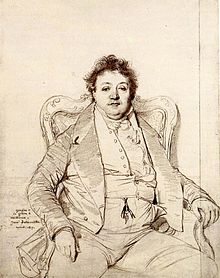Charles Thévenin
| Charles Thévenin | |
|---|---|

Portrait of Thévenin by Dominique Ingres (1817).
|
|
| Born |
Charles Thévenin 12 July 1764 Paris, France |
| Died | 28 February 1838 (aged 73) |
| Nationality | French |
| Education | Académie royale de peinture et de sculpture |
| Known for | painting |
| Movement | Neoclassicism |
Charles Thévenin (12 July 1764 – 28 February 1838) was a neoclassical French painter, known for heroic scenes from the time of the French Revolution and First French Empire.
Born in Paris, the son of a court architect, Charles studied painting at the Académie royale de peinture et de sculpture under François-André Vincent. Winning second prize in the prix de Rome for Joseph recognised by his brothers in 1789, he won first prize in 1791 for Regulus returns to Carthage.
Thus he received his first commissions and in 1790 produced the first version of The Taking of the Bastille, which produced a number of commentaries. He received a second prize at the Concours of Year II for The 12 July 1789.
After giving up history painting for decorative subjects for a time, in 1798 he produced Augereau on the bridge at Arcole, the first in a series of paintings glorifying the Empire. He left for Italy, staying at the French Academy in Rome, meeting Dominique Ingres and becoming the Academy's director from 1816 to 1823. On his return to Paris, he was elected a member of the Académie des Beaux-Arts in 1825, then named Conservateur of the Cabinet des estampes in the Bibliothèque nationale.
The Festival of the Fédération, 14 July 1790, on the Champ-de-Mars (1792)
The Taking of the Bastille (1793)
Augereau on the bridge at Arcole, 15 November 1796 (1798)
Surrender of the town of Ulm, 20 October 1805, Napoleon I receives the capitulation of general Mack (1815)
...
Wikipedia
